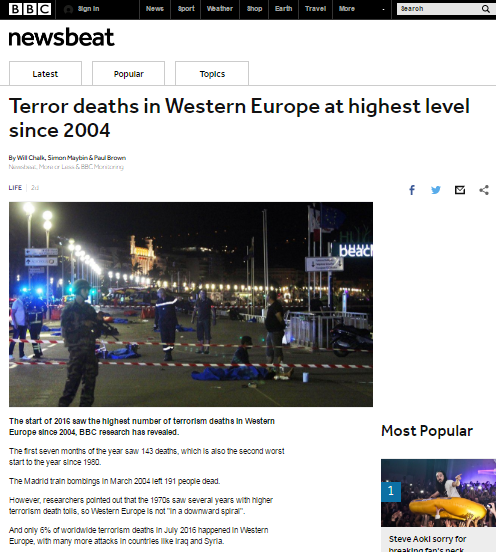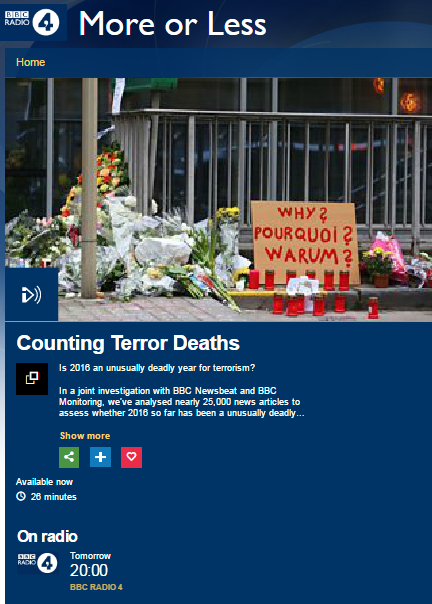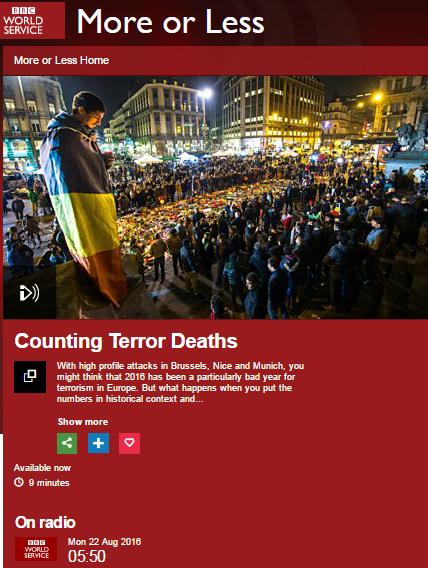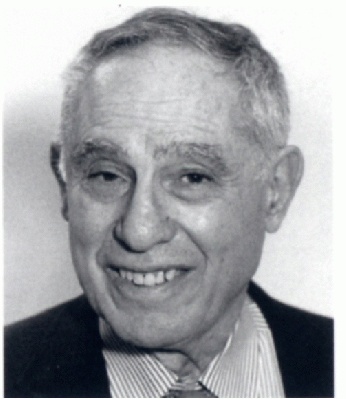The BBC Radio 4 programme ‘More or Less’ and Radio 1’s ‘Newsbeat’ were commended in the recent BBC Trust review of the impartiality of the corporation’s reporting of statistics in its news and current affairs output. Those two programmes recently came together with BBC Monitoring to produce a multi-platform feature on the subject of deaths resulting from terrorism in Western Europe.
“Terror deaths in Western Europe at highest level since 2004” Newsbeat
“The start of 2016 saw the highest number of terrorism deaths in Western Europe since 2004, BBC research has revealed.
The first seven months of the year saw 143 deaths, which is also the second worst start to the year since 1980.”
“Counting Terror Deaths” ‘More or Less’, BBC Radio 4
“Is 2016 an unusually deadly year for terrorism?
In a joint investigation with BBC Newsbeat and BBC Monitoring, we’ve analysed nearly 25,000 news articles to assess whether 2016 so far has been a unusually [sic] deadly year for terrorism. It certainly feels like it. But what do the numbers say? We estimate that, between January and July this year, 892 people died in terrorist attacks in Europe – making it the most deadly first seven months of a year since 1994. But the vast majority of those deaths have been in Turkey. The number for Western Europe is 143, which is lower than many years in the 1970s.”
“Counting Terror Deaths” ‘More or Less’, BBC World Service Radio
“With high profile attacks in Brussels, Nice and Munich, you might think that 2016 has been a particularly bad year for terrorism in Europe. But what happens when you put the numbers in historical context and compare them with figures for the rest of the world?”
The research underlying all those reports used a “working definition” of terrorism described as follows in the radio programmes:
“Terrorist attacks are acts of violence by non-state actors to achieve a political, social, economic or religious goal through fear, coercion or intimidation.”
Since the surge in terror attacks against Israelis began last September, the BBC has provided its audiences with a variety of explanations for the violence. The preferred explanation proffered by the corporation’s Middle East editor has been ‘the occupation’.
“Many Palestinians have told me they believe the reason for the attacks is that another generation is realising its future prospects will be crippled by the indignities and injustice of the occupation of the Palestinian territories, including East Jerusalem.”
“Violence does not come out of the blue. It has a context. Once again, the problem is the unresolved conflict between Palestinians and Jews. It is at the heart of all the violence that shakes this city.
A big part of the conflict is the military occupation of the Palestinian territories, including East Jerusalem, that has lasted for nearly 50 years. It is impossible to ignore the effects of an occupation that is always coercive and can be brutal.
In successive Palestinian generations, it has created hopelessness and hatred. In some cases, that bursts out into murderous anger.”
“Palestinians say they don’t need to be told when to be angry after almost fifty years of an occupation that is always coercive and often brutal.”
Another ‘explanation’ repeatedly offered to audiences goes along the following lines:
“The recent rise in violence is blamed by Palestinians on the continued occupation by Israel of the West Bank and the failure of the Middle East peace process.”
In addition to those political factors, the BBC has frequently cited a religious factor as context to the surge in violence.
“The current escalation was partly triggered by Palestinian fury over restricted access to the Al Aqsa Mosque compound in Jerusalem’s Old City. The site is holy to Muslims and Jews, who call it Temple Mount.”
“In the last few weeks what we’ve had is this big flare-up in tensions over the Al Aqsa Mosque compound; about access to this important religious site.”
“But the key to all of this, we think, is this ancient dispute about rights of worship at the Al Aqsa Mosque – which is called Temple Mount by Jews of course.”
“Tensions have been particularly high in recent weeks over the long-running issue of access to the al-Aqsa mosque compound in East Jerusalem.”
But despite having cited political, social and religious factors as explanations for the Palestinian violence against Israelis in recent months, as has been documented here on countless occasions the BBC nevertheless universally refrained from describing those attacks as terrorism or their perpetrators as terrorists.
With the corporation now having finally found a working definition of terrorism with which it is apparently comfortable, its long-standing editorial policy of eschewing accurate terminology when covering Palestinian attacks on Israelis clearly becomes even more egregious.
Related Articles:
BBC Complaints: terror attacks in Jerusalem and Tunisia are “very different”
Radio 4 gives insight into BBC avoidance of the use of the term ‘terror’ in Israel


